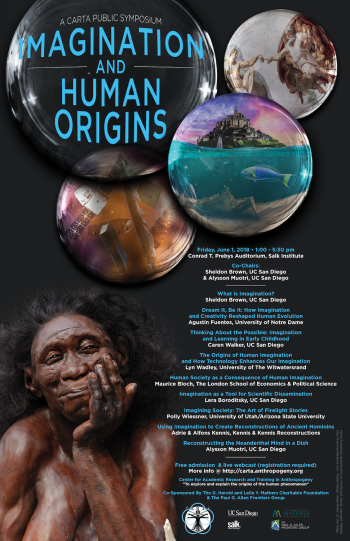Imagination and Human Origins
Sheldon Brown, Community Member
Alysson Muotri, UC San Diego
Co-sponsored by the Center for Academic Research and Training in Anthropogeny (CARTA) and The Paul G. Allen Frontiers Group
Try to remember the first time in your life when you imagined something. It may have been imagining what was behind the door or under the bed, or a fantastic universe of wonders and exciting adventure. As children, our imaginations are furtive and encouraged as ways in which we develop our cognitive capabilities. As we grow older, we may not imagine these territories in quite the same manner, but we continue to heavily use and depend on our imagination in our daily lives, imagining different situations that might occur in a few moments or in a few years. Thus, we actually spend a large amount of time in our own particular universe imagining many possible different ones. Why we do this and how this capacity evolved during evolution? Imagination probably helped our ancestors to be successful in making decisions and live in complex societies. Imagination is key to advancing technology. In this CARTA meeting, we plan to explore imagination as a unique/enhanced human ability. We will discuss the impact of human imagination in sciences and arts, the evolutionary origins, the consequences of imagination impairment and the fundamental genetic and neurological basis of human imagination.
Media for each talk can be played by clicking on icons in the table below, or by clicking on the individual talk titles below and then the attachment file at the bottom of the page.
| Speakers | Media | Session |
|---|---|---|
 Ajit Varki  Alysson Muotri |
|
Welcome & Opening Remarks |
 Sheldon Brown |
|
What Is Imagination? One of the traits we attribute to differentiating our particular version of humanity from the rest of the realm of sentience is our “imagination”. The particular capabilities and operations of our imagination shape the behaviors that have allowed homo sapiens to create our anthropic era. But what is “imagination”? Imagination is one of those mushy terms that can be used to describe so many things that it ends up meaning almost nothing. Considering how imagination operates as a cognitive... read more |
 Agustín Fuentes |
|
Dream It, Be It: How Imagination and Creativity Reshaped Human Evolution Humans can see the world around them, imagine how it might be different, and translate those imaginings into reality…or at least try to. Meaning, imagination, and hope, are as central to the human evolutionary story as are bones, genes, and ecologies. Current paleoanthropological, archeological, and biological data make it abundantly clear that the human lineage, especially in the last two million years or so, underwent specific morphological changes alongside less easily measurable, but... read more |
 Caren Walker |
|
Thinking about the Possible: Imagination and Learning in Early Childhood Conventional wisdom suggests that knowledge and imagination, science and fantasy, are deeply different from one another – even opposites. However, new ideas about children’s causal reasoning suggests that exactly the same abilities that allow children to learn so much about the world, reason so powerfully about it, and act to change it, also allow them to imagine alternative worlds that may never exist at all. A large portion of our psychological lives is spent disengaging from our immediate... read more |
 Lyn Wadley |
|
The Origins of Human Imagination and How Technology Enhances Our Imagination Archaeological evidence for imagination is present, but rare and often controversial, before the appearance of Homo sapiens sapiens. The implication is that imagination is not the sole preserve of people like us; nonetheless, early H. sapiens took imaginative expressions to new heights. By 100 000 years ago, perforated and ochre-covered marine shells were found in early modern human burials and living sites and thereafter more material culture items convey imagination. Shell beads were strung... read more |
 Maurice Bloch |
|
Human Society as a Consequence of Human Imagination The social of human beings has been, for at least fifty thousand years, totally different to that of our nearest relatives the Chimpanzees. This difference is due to the fact that human social organisation is not simply a matter of ever more subtle communication between individuals. It is also a matter of imagination. This imagination consists of roles such as wife, professor, nephew, police officer, president etc. which regulate certain aspects of the social and also of the membership of... read more |
 Lera Boroditsky |
|
Building Complex Knowledge with Language and Imagination One of the great mysteries of the mind is how we are able to think about things we can never see or touch. How do we come to represent and reason about abstract domains like time, justice, or ideas? All of our experience of the world is physical, accomplished through sensory perception and motor action. We collect photons through our eyes, respond to physical pressure in our ears, and bend our knees and flex our toes in just the right amount to defy gravity. And yet our internal mental lives go... read more |
 Polly Wiessner |
|
Imagining Society: The Art of Firelight Stories Some 300-400,000 years ago, early humans gained control of fire, extending the day and significantly altering their circadian rhythms. Humans became the shortest sleepers of all primates. Since the 4-6 hours gained was not economically productive time, selection pressures for these changes must have been strong. What were the benefits to human societies of the extending the day by firelight? Here I will compare day and night conversations and activities of the Kalahari Bushmen to better... read more |
 Adrie Kennis  Alfons Kennis |
|
Using Imagination to Create Reconstructions of Ancient Hominins |
 Alysson Muotri |
|
Reconstructing the Neanderthal Mind in a Dish The complexity of the human brain, with thousands of neuronal types, permits the development of sophisticated behavioral repertoires, such as language, tool use, self-awareness, symbolic thought, cultural learning and consciousness in a short period of evolutionary time. Understanding what produces such complex network system during brain development has been a longstanding challenge for neuroscientists and may bring insights into the evolution of human cognition. Human pluripotent stem cells... read more |
 Sheldon Brown  All Speakers  Pascal Gagneux |
|
Wrap-up, Question and Answer Session, Closing Remarks |
| Attachment | Size |
|---|---|
| 1.53 MB | |
| 1.13 MB | |
| 520.06 KB | |
| 752.19 KB |
If you enjoy this event, please consider supporting CARTA's quest to explore and explain the human phenomenon.


